The definitive guide to choose Ubuntu or Debian as your next GNU Linux distribution
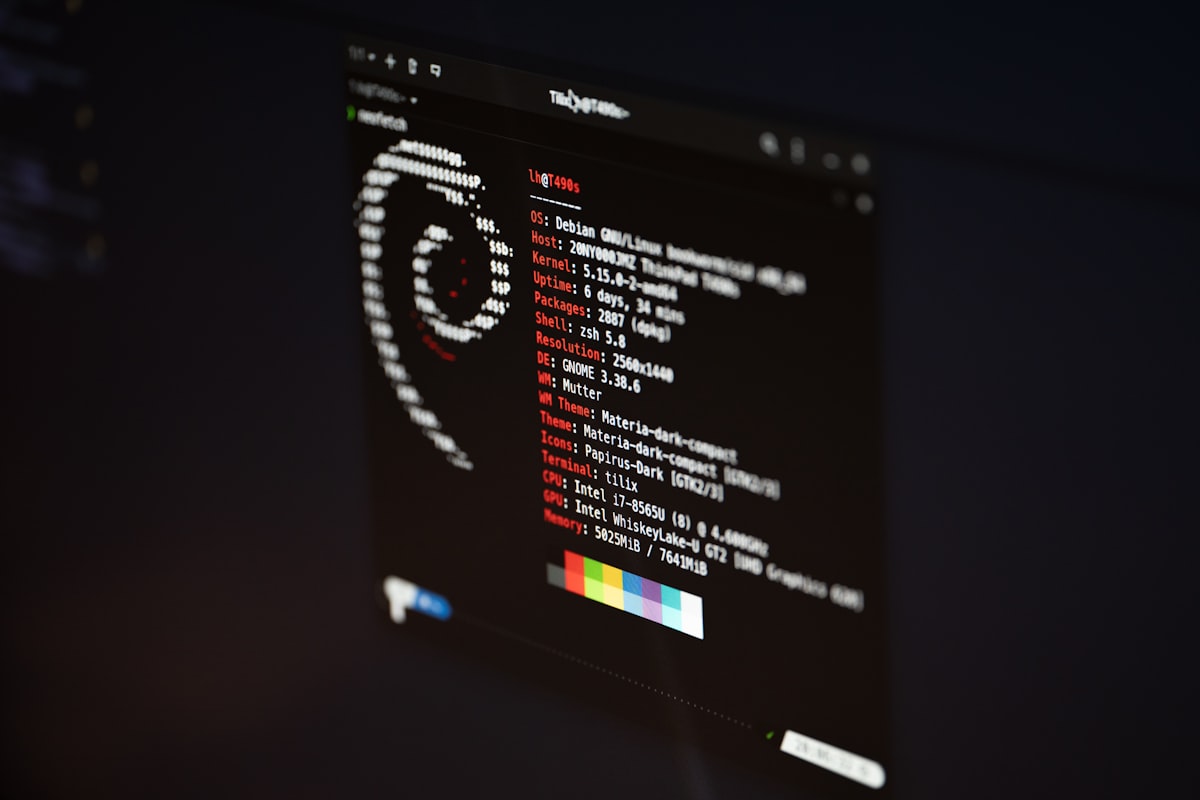
I am very sure that many of you have had trouble choosing a desktop operating system of your choice when you first started out with a personal desktop or laptop PC. If software freedom is important to you, there is no replacement for GNU Linux. You have a plethora of distributions to choose from.
One of the oldest and most popular is Debian. An equally popular and more commercially accepted distribution is Ubuntu, a Debian-based distribution whose core developers are from the Debian project itself.
Ubuntu is better supported by the majority of applications, as it is the distribution that ships with a lot of new hardware. Therefore, many software publishers test their software for Ubuntu. Not that they won't work on Debian, nor would most popular software publishers ignore Debian altogether, in most cases their software repository would support Debian Stable. For example, Ghost, a popular publishing software that we host ourselves, works fine on Debian Stable, even though it is officially tested and supported on Ubuntu.
Despite the differences between the distributions and their target audience or use case, many of you are always confused between the two, especially when a new release of Debian is around the corner. As it is currently the case when Debian 12 is about to be released and you have to choose between Ubuntu and the upcoming release of Debian for your hardware.
If you're struggling to decide between Ubuntu and Debian, this article is for you.
Debian
Debian is a community-based project focused on being reliable, secure and stable, with extensive hardware support. It is also one of the oldest and most well established GNU Linux distributions.

The name comes from the names of the creator of Debian, Ian Murdock, and his wife, Debra.
The Debian project was officially founded by Ian Murdock on 16 August 1993. Back then, the whole concept of a "distribution" of Linux was new. Ian wanted Debian to be a distribution that would be openly developed, in the spirit of Linux and GNU project.
The creation of Debian was sponsored for one year (November 1994 to November 1995) by the GNU Project of the FSF.
The Debian Social Contract is an important set of guiding principles that the Debian project has adhered to since its release on 5 July 1997:
- Debian will remain 100% free.
- We will give back to the free software community
- We will not hide problems.
- Our priorities are users and free software
- Works that do not meet our free software standards
In other words, this is the publicly stated policy of the Debian project. Any major change in the way Debian works cannot be made without changing the Debian Social Contract.
Despite its ties to GNU and the FSF, Debian has created its own non-profit organisation, Software in the Public Interest (SPI), to handle financial support for Debian.
Debian is often criticised for having older packages. In my personal experience, Ubuntu is not the most up-to-date either, even compared to Debian. The whole point of Debian having older packages is that they are tried and tested and therefore stable. Packages that are stable enough for desktop, laptop and your server at the same time. I personally use Debian on my laptop and server at the same time with absolutely no extra effort. I would put it another way, if your hardware is properly supported for the current Debian stable, you are all set! Now, if you are missing some newer packages, backports come to the rescue, you can get packages from Debian testing via backports for current Debian stable. I think this is a good option, but I won't recommend using it unless necessary, as you lose the oversight of the Debian Security team.
Debian Stable comes with the Debian Desktop Environment by default, which is basically the vanilla Gnome desktop environment.
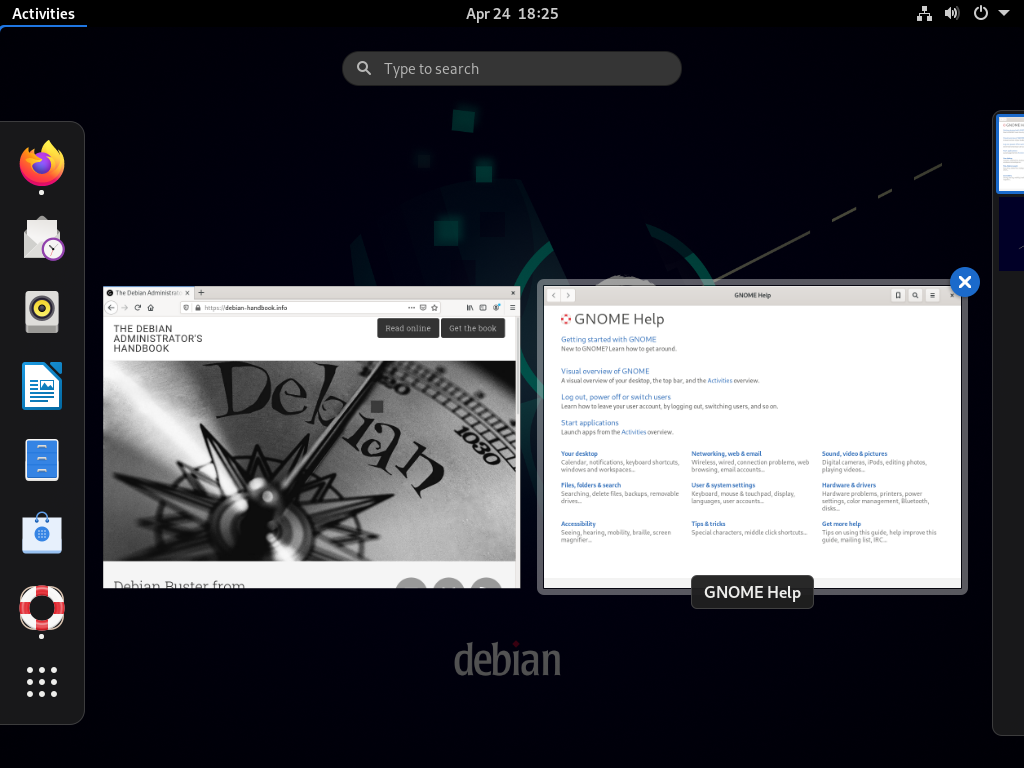
Debian's Gnome experience is very reliable and stable. One of the things I like most about Debian is that there is no unnecessary push towards one particular thing like a default DE or an application delivery mechanism like Canonical's Snap or Flatpak. It lets you choose what works best for you. Packages for both snap and flatpak are available in the Debian stable repository for you to install as needed.
Ubuntu

Mark Shuttleworth (South African entrepreneur) brought together a small team of Debian developers to form Canonical Ltd (a privately held UK computer software company) and set about creating an easy-to-use Linux desktop called Ubuntu.
Canonical also provides commercial support and services for Ubuntu.

Ubuntu is a Debian-based distribution developed through the combined efforts of commercial and community teams. It aims to provide a better distribution with support and security patches available to its users free of charge for both short and long term releases.
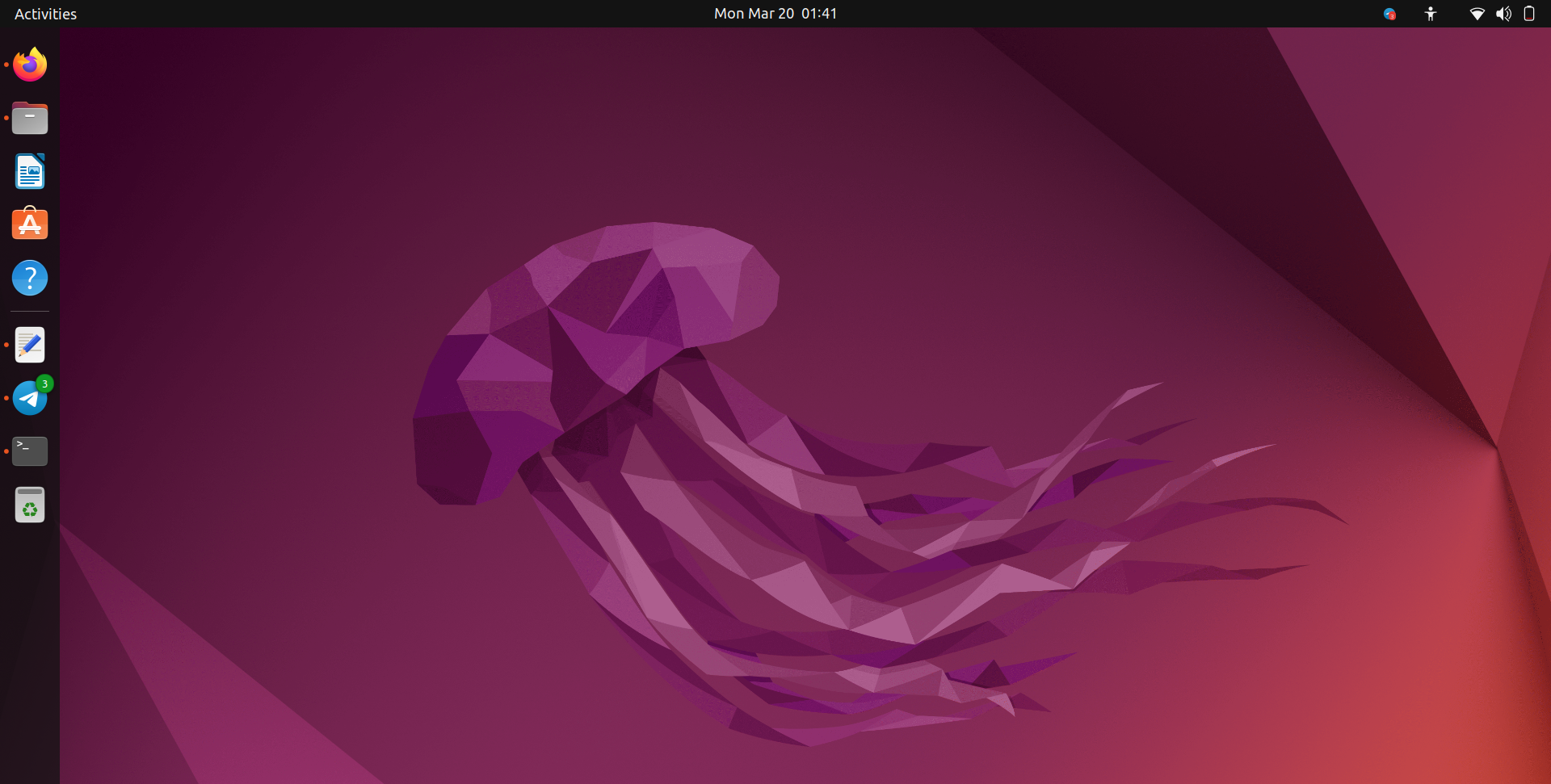
Ubuntu comes with a modified version of Gnome for the desktop environment.
Debian is the rock on which Ubuntu is built
Ubuntu is the most popular GNU Linux distribution in the world. This is because most popular PC vendors ship their products with it when it comes to offering GNU Linux as a choice of operating system.
The main difference with Debian, apart from company funding and work culture, is the release cycle, which is every six months for regular releases (except when a LTS release is due) and two years for LTS releases. Regular releases of Ubuntu are supported for 9 months and LTS for 5 years.
Debian stable is released about 2 years after the previous release. It has a total lifetime (from release to end of security updates) of about 3 years.
If long-term support is what you are looking for, Ubuntu is the clear winner as it is supported for 2 years longer than Debian Stable.
Ubuntu 18.04 LTS Bionic Beaver, released on 26 April 2018, will be supported until April 2023. This makes Ubuntu LTS a very reliable option for the long term.
Snap
Snap is Canonical's attempt to solve the problem of delivering or distributing applications via a Snap Store that it hosts and manages.
A Snap Store is like any other app store where publishers upload their Snaps for you to easily download.
A snap is a bundle or application container that contains all the necessary dependencies and is designed to work on all distributions that use snapd. Snapd is the background service for managing and automatically updating your snaps. As a container, snap applications are completely isolated in their own sandbox, which brings a lot of security benefits.
The adoption of snaps hasn't been universal, with Fedora and other related distributions less than enthusiastic due to Canonical's direct control of the snap store. To date, there is no alternative application repository other than Canonical's. Just as Fedora has its own application repo for Flatpak other than Flathub. I do see some value in an open source company hosting Snap Store, it provides some infrastructure and collaboration that some developers or publishers may need to distribute their applications using Snap Store.
Ubuntu is pushing Snaps hard, replacing some of the standard traditionally packaged applications such as Firefox with its Snap version. Interestingly, contrary to popular belief, the move came directly from Mozilla. Mozilla is adopting Snap and Flatpak for application distribution in favour of authentic and much faster updates.
Ubuntu's Snap Store is seeing fair adoption from both proprietary and open source software publishers, including Slack, Skype, 1password, Microsoft, Spotify, KDE, Google, etc.
Ubuntu and its official derivatives pre-install Snap by default, as well as other Ubuntu-based distributions such as KDE Neon, Solus, and Zorin OS.
According to an official announcement in collaboration with all official Ubuntu flavors, starting with the next release due in April 2023, version 23.04, Lunar Lobster, to promote the use of snaps as a means of application deployment, Flatpak won't be installed by default. This essentially means that new users won't see Flatpak applications in the software, and instead will be presented with Snaps from the Snap Store until they manually install and configure Flatpak.
This is a courageous move to promote Canonical's own app delivery or distribution/packaging mechanism. Official and verified adoption of snaps by KDE and Mozilla adds more boost to it. I like how they are doubling down on Snaps and its security advantages and perhaps this could be the future of application delivery with several other stores opening up for Snaps.
Ubuntu Certified hardware
Even if you didn't buy a desktop or laptop PC with GNU Linux pre-installed, chances are that Ubuntu has tested your hardware and certified it to work with Ubuntu. You might think this is not a serious certification, but you would be surprised at the amount of work that goes into the hardware certification program. It is crucial for people looking for hardware, especially laptops, that will run a GNU/Linux distribution out of the box.
Several teams from Ubuntu's parent company Canonical, including Hardware Enablement (HWE) engineers, are assigned to work with various PC manufacturers to create what is known as an OEM image. This OEM image includes the PC manufacturer's specific settings and configurations, as well as the drivers and firmwares that your hardware needs to run optimally. Sometimes newer hardware drivers do not make it into the upstream Linux kernel used by the Ubuntu LTS release. Switching to a newer kernel would mean giving up the stability of an LTS kernel for your hardware. In layman's terms, an OEM kernel would give you the benefits of having the latest kernel to support your newer hardware components on the same kernel that ships with the Ubuntu LTS release. You can appreciate the amount of work that goes into pulling and merging these improvements from the mainline kernel.
This work is not done in a vacuum; Ubuntu engineers are in constant contact with component vendors and manufacturers to help debug, test hardware drivers and firmware (BIOS, UEFI).
Canonical's QA team performs an extensive set of over 500 hardware tests focused on OS compatibility to ensure the best Ubuntu experience. Every aspect of the system is tested and verified.
The benefit of this process for you as a user of certified hardware who never got the special OEM image for your device is that you get to install and use the OEM kernel, which contains bug fixes and drivers for your newer hardware that you may never find in a generic kernel released by Ubuntu or an upstream Linux kernel.
It is as good as Ubuntu's generic kernel and is publicly available in Ubuntu's archive.
Ubuntu-certified devices are based on Long Term Support (LTS) releases and therefore receive updates for five years.
I have experienced the benefits of the OEM kernel first hand. It fixed wake-up problems for me on a ThinkPad with an AMD 6850U processor and embedded graphics when running 22.04 LTS. I got a newer kernel and all the patches I needed for a much better user experience. Otherwise it gave me serious problems on Ubuntu 22.10.
Non-free
Ubuntu comes with non-free firmwares, drivers and codecs by default. It is designed to work out of the box for everyone.
Debian is very different.
Although non-free software isn't part of Debian, they support its use and provide infrastructure including a bug tracking system and mailing lists for non-free software packages.
Debian aims to be both free as in freedom and free of charge. Up to the current Debian stable release, version 11, the Linux kernel shipped with Debian's main repository is completely free by default and does not contain any non-free software, firmware or binary blobs. If Debian didn't include non-free software in a separate repository hosted on the main server, it would be a completely free distribution.
For a long time, Debian users have faced problems due to the lack of non-free firmware, especially on newer hardware such as laptops, as the official Debian installation media required users to install it manually using this guide.
This process can be tedious and frightening for some new users. This has also hurt the adoption rate of Debian. It is not uncommon on Windows either, if you are installing it on a system you are building.
There was a drastic change in the Debian Social Contract in October 2022 regarding the inclusion of non-free firmware in official installation media, including live ISOs. It was decided by a general resolution.
I have to say that this is not a big change technically, as installation media with non-free firmware was already available unofficially on the official Debian website anyway. And no one in the Debian community refuses to help you if you need help using non-free firmware or drivers to enable the use of Debian itself.
Installation
Ubuntu's default installer is limited in what you can install, it does a good default installation for you without giving you much choice.
It is designed to be simple for an everyday user. I wish we could play with it a bit. I wish it was a bit more flexible. Ubuntu's installer is not about you, it is about good defaults and a set of applications that it installs for you, you either go with the minimal or full installation. Take it or leave it.
The latest installer for Debian is just as good in terms of ease of use. It may look complex if you just take a sneak peek, but what it does instead is show a step by step story of where you are before you reach the finish line.
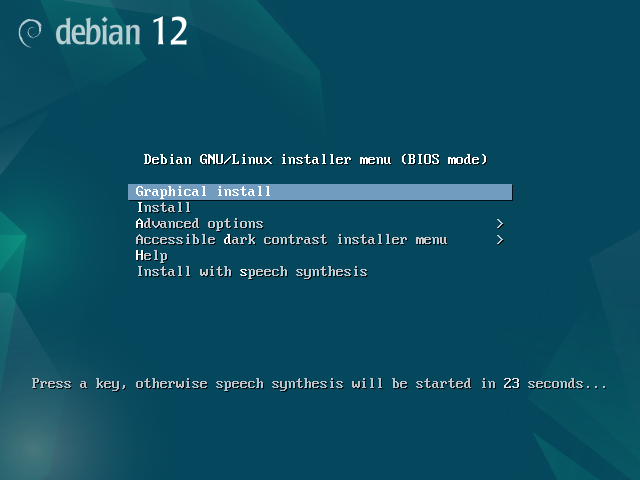
My advice to you is not to get nervous and keep going. It's one of the best installers where you don't just sit and watch, you get to participate in the process and understand the very basics of GNU Linux installation.
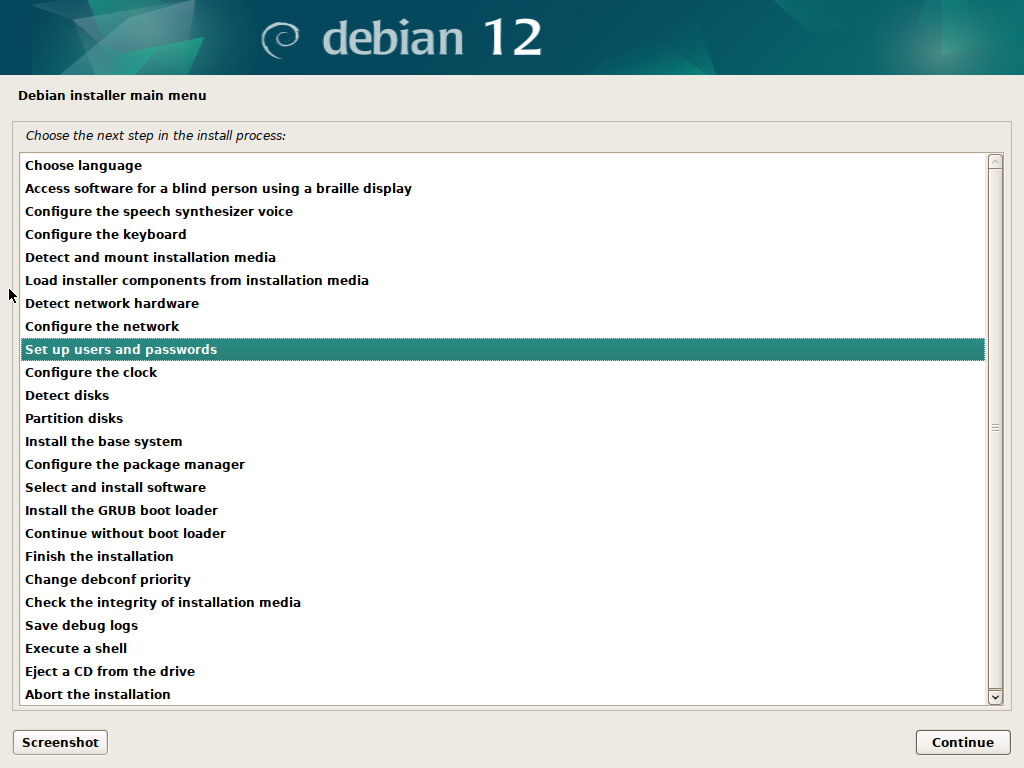
The Debian installer also gives you good defaults, while giving you other options like choosing the DE and other tools you want to install, etc.
Telemetry
Debian is free of it, almost! If you do not count the popularity contest package. It is strictly opt-in and defaults to no during installation. It is not even de facto telemetry.
If you choose to participate in the popularity contest.
The popularity-contest project is an attempt to map the usage of Debian packages.
The popularity-contest package comes with a script that generates a list of packages installed on your system, in order from most recently used to least recently used. It reports your distribution (e.g. Debian, PureOS, etc.), the system architecture (e.g. amd64, i386, etc.), the version of the popularity-contest package, the access time of relevant files together with the generated list of packages on your system to the popcon server via email or HTTP. This is done once a week.
Every day, the popcon server anonymises the result and publishes this survey.
Your Ubuntu installation includes a tool called Ubuntu Report. It is designed to report hardware and other collected metrics such as installer or upgrade information. This tool gives you the option to see what it will report and asks for your permission before it does so. Ubuntu's welcome screen will explicitly ask you about this the first time you boot.
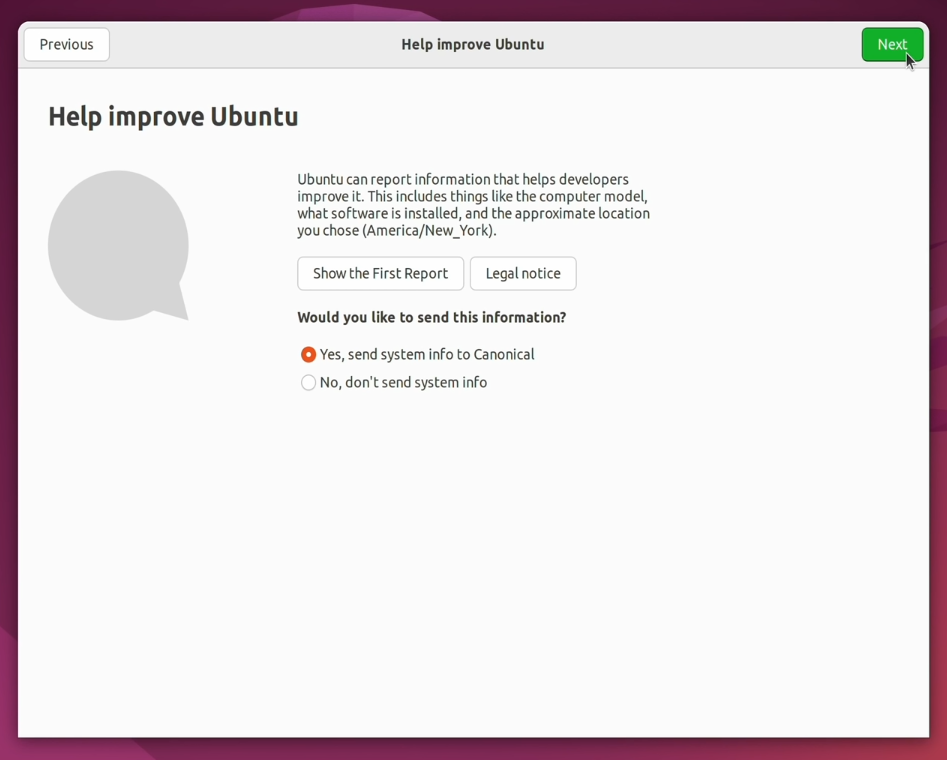
By default, you can only report your data collection once per distribution version.
Although this tool is mainly noticed on the welcome screen of a Ubuntu desktop/server with DE, there is also a command line tool ubuntu-report for headless installations. The default mode for ubuntu-report is interactive. It displays the data being sent and asks if you want to send it or not.
The information it reports if you choose to send it to Canonical is as follows:
- Ubuntu version like 22.04 or 22.10
- Computer Model details viz. Vendor, Product and Family (basically your precise Laptop/PC model)
- Bios's Vendor and version
- Arch, GPU Vendor and Model
- RAM Size, Disk Partitions size
- Screens's Size, Resolution, Frequency
- Whether opted for Autologin
- Wheter opted for LivePatch
- Session information including DE, Name and Display server type
- Language, Timezone
- Install Media Release version, Type, Whether OEM
- Partition Method, Download Updates, Language
- Whether opted for Minimal installation or Restricted Addons
Some users may get annoyed seeing the amount of data sent to Canonical compared to Debian's popularity contest. According to Ubuntu, this information can't be used to identify an individual machine.
Support
There is plenty of help available from the community via IRC, forums, etc. if you need it. This is the same for both Ubuntu and Debian.
What matters for a company or a professional workstation user is the commercial support.
Ubuntu Pro
Ubuntu LTS is the release of choice for most businesses and professionals.
Canonical has introduced a full support package starting at $25/year called Ubuntu Pro Subscriptions. Ubuntu Pro helps you reduce your average CVE exposure time from 98 days to 1 day with enhanced CVE patching, ten years of security maintenance, optional phone/ticket support and operations for the full stack of open source applications.
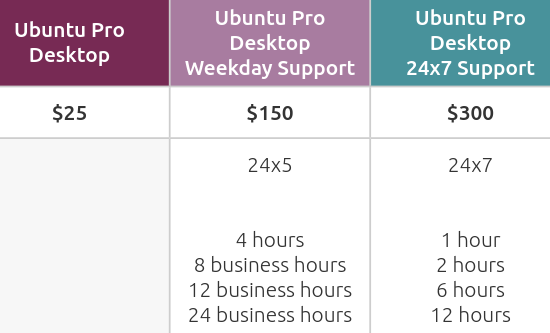
While many of you would consider Ubuntu Pro to be a redundant product, knowing that you already have the maintenance updates and security patches offered by Ubuntu LTS for a good five years.
Ubuntu Pro obviously makes the security patches faster by reducing the average CVE exposure time as promised in the subscription. This may not be as important to you.
There's a big elephant in the room and that's the limited coverage of packages under standard support offered by Ubuntu or any distribution. You should know that Ubuntu or Debian only supports a subset of packages, mostly in the main repository. For Ubuntu it is called Ubuntu Base packages, which only covers packages in the main and restricted repositories, not the universe or multiverse repositories.

This is where you start to see the real benefits of a Ubuntu Pro subscription. As well as faster security patches for over 2300 packages in the Ubuntu Main repository, you get coverage of over 23000 packages in the Universe repository. Universe repository is community-maintained, free and open software; it no doubt contains everyday software.
Other features include kernel live patching, real-time kernel and systems management at scale with Landscape.
Anyone can use Ubuntu Pro for free on up to 5 machines, or 50 if you are an official Ubuntu Community member
Long-term support (LTS) releases occur every 2 years, with 5 years of standard support extended to 10 years with an Ubuntu Pro Desktop subscription.
Debian vs Ubuntu Pro and Debian LTS/ELTS
Debian Stable releases are only supported by the Debian Security Team for 3 years after release.
The Debian Security Team only handles packages in the main repository, as packages in contrib or non-free repo are not part of the Debian distribution.
Because Ubuntu Pro is made available for free for personal use with coverage of over 23000 additional packages from the universe repo.
In the absence of a similar Pro subscription from Debian, Ubuntu is the de facto choice for security reasons, is it not? Not really.
On a typical Ubuntu desktop installation, less than 10% of the packages come from the Ubuntu Universe/Multiverse repository. So the proportion of total packages from Universe [the one supported by the Ubuntu Pro subscription] is much lower than you might think. There is also a huge difference in the number of packages available in the main repo in Debian vs. Ubuntu.
According to pkgs.org, Debian stable's main repo has a total of ~58250 packages for amd64. Ubuntu 22.04 LTS main repo has a total of 6026 and restricted has a total of 686 packages for amd64.
One important fact that we are missing here is that everyday software that we only find in Ubuntu's universe repo, such as transmission, VLC, keepassxc, handbrake etc, are already available in Debian's main repo. Do you really need Ubuntu Pro or a substitute for it in Debian? I doubt it.
So don't jump on the bandwagon just yet.
Debian LTS is supported by volunteers, organisations and companies that benefit from it. This program is led by a French company specialising in Debian GNU Linux called Freexian SARL. It is a company owned by Debian developer Raphaël Hertzog, yes, the co-author of the infamous book for Debian called "The Debian Administrator's Handbook".
Freexian is organising a corporate sponsorship campaign to raise the funds and do the necessary to provide 5 years of support.
Freexian also offers commercial extended long-term support for Debian. This service extends security support for old Debian releases up to 10 years, as Ubuntu Pro does.
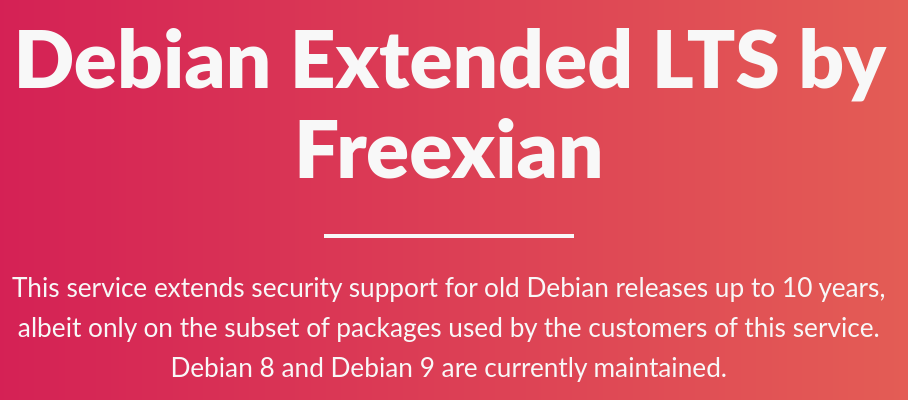
It also offers a commercial PHP LTS service which provides alternative PHP releases for various Debian releases. It may be useful for those involved in web hosting and PHP applications.
State of collaboration
Debian is the rock solid base for Ubuntu.
The founder of Canonical and Ubuntu expressed a desire to work on Debian more than a decade ago by offering to share manpower with Debian. There is a good amount of contribution from the Canonical team that goes into Debian. This is how the open source community works and they give back.
As read above, many sponsors [including Toshiba, Github] and volunteers are coming together under the Freexian program to extend Debian's 3 year support to another 2 years for all.
It is no secret that IBM also employs people to work on the s390x port. Similarly many other companies like ARM directly dedicate resources to Debian project. On the face of it, it may look like a give-and-take relationship, but it is much more and benefits the project for the greater good.
Things I don't like about Debian
If you have too new hardware that isn't supported by the current Debian stable, you would have to use the Debian testing branch. Security patches are not officially supported, so it's a no-go for an average user.
More importantly, it doesn't break often. That takes the fun out of fixing your system. Just kidding :)
However, if you are looking for newer software packages, there are backports available. This would definitely get you a newer version that should work for you. Not a complete solution like upgrading to Debian Testing at all.
You might want to look at a Debian-sid based distribution like Siduction if you are looking for newer packages instead.
Things I don't like about Ubuntu
Snap is cool, but it is being forced on users. While I understand the aggressive push behind using snaps by default in Ubuntu and its official flavors, it won't be well received by the open source community. It could act as a magnet for Flatpak.
Snap is slower for some users depsite attempts of optimisation by Ubuntu. The lack of an alternative Snap store is a no-go for many. The whole idea of Canonical controlling the Snap Store is also frowned upon.
Personally, the lack of vanilla Gnome desktop flavour discourages me from using it long term. Not everyone likes the heavily modified version of Gnome and their default desktop environment.
The above two reasons are among many that made a trending distribution called VanillaOS move from Ubuntu core to Debian sid.
No clear separation between non-free and free packages. If I personally own hardware that is capable of running without the need for non-free firmware, I should be able to use a free kernel, as Debian Stable is.
I also wish Ubuntu had a rolling or semi-rolling release. Ubuntu's regular releases are not bleeding edge even when they are released. For some users, the latest is the greatest. Ubuntu is not the distribution for them.
Which one do I recommend to whom and why?
If you have older hardware, are comfortable with backports, flatpaks for newer packages, love vanilla Gnome, favour a community-oriented distro, just go with Debian GNU/Linux.
If you have newer hardware, especially Ubuntu-certified hardware, want long-term support, love the idea of Ubuntu Pro's security features, need paid phone/email support, adore Snap, modified Gnome DE, use software officially tested/supported by vendors on Ubuntu, go with Canonical's Ubuntu. Absolutely fine distribution.
So that's all for now, thanks for reading and we hope we've helped you choose!




